Topics
Category
Era
Minnesota Farmer-Labor Party, 1924–1944
Minnesota's Farmer-Labor Party (FLP) represents one of the most successful progressive third-party coalitions in American history. From its roots in 1917 through the early 1940s, the FLP elected hundreds of candidates to state and national office and created a powerful movement based on the needs of struggling workers and farmers.
The history of the FLP unfolded in four stages: emergence (1917–1924), consolidation (1924–1930), high tide (1930–1938), and decline (1938–1944). In the first stage, two broad-based organizations, the Farmers’ Non-Partisan League and the Working Peoples’ Non-Partisan League, joined forces. Together, they challenged Minnesota’s ruling Republicans by running their own slate of candidates in the primary elections.
In the fall of 1917, organizers from the League crisscrossed the state. They registered fifty thousand farmers for an anti-monopoly program patterned after the successful effort made by North Dakota farmers the year before. In response, the administration of Republican governor J. A. A. Burnquist carried on a campaign of harassment. His staff branded both farm and labor participants as unpatriotic and even jailed leaders for disloyalty.
Refusing to back down, farmers and workers continued to organize. In 1918, Congressman Charles Lindbergh came within 51,000 votes of defeating Burnquist in the Republican primary. In the general election, the Farmer-Labor coalition elected thirty three of its members to the state legislature and replaced the Democrats as the main rivals of Minnesota's Republican Party. Maintaining its alliance in 1920 and 1922, the FLP continued to elect state and local officials. These included two U.S. senators: Magnus Johnson and Henrik Shipstead.
In 1924, a second stage began when the two organizations founded the Farmer-Labor Federation. (It was replaced by the Farmer-Labor Association the following year.) The association was the educational and organizational center of the movement. The FLP was its electoral arm.
In the Republican-friendly 1920s, the FLP found itself swimming upstream. With its large network of committed members in both city and country, however, the party continued to elect candidates. It remained the strongest opposition party to the Republicans.
In 1930, the steady work paid off. Floyd B. Olson defeated the Republican and Democratic candidates for governor, beginning the third and most successful period of Farmer-Labor history. A gifted orator, Olson voiced the feelings of Minnesotans struggling with unemployment and economic hardship. Voters re-elected Olson as governor in 1932 and 1934. He was a sure winner for the U.S. Senate before he died of a stomach tumor in 1936.
Olson’s success, combined with skillful organizing, sparked dramatic growth in Farmer-Labor participation. Dues-paying membership in the party’s association rose to almost forty thousand as organizers set up clubs across the state. Hundreds of Farmer-Laborites held elected offices at all levels of government, from city council to U.S. Senate. In 1936, the FLP captured six of nine congressional seats, the governorship, and a solid majority in the state House of Representatives.
Although the FLP controlled the governorship for eight years, it was never able to win a majority in the state senate and enact their full agenda. Pieces of its platform, however, did become law. These included a moratorium on farm foreclosures, relief for the unemployed, banking reform, a state income tax, and thirteen new state forests.
The glory days of the Farmer-Labor movement ended in 1938. Harold Stassen, a young and energetic Republican reformer, defeated Olson’s successor, Elmer Benson. FLP candidates for statewide office continued to outpoll the Democrats in Minnesota. They finished far behind the Republicans, however, in 1940 and 1942.
When the U.S. entered World War II and the American economy improved, support declined for the FLP’s Depression-era policies. Committed to re-electing Franklin Roosevelt to a fourth term, most Farmer-Laborites agreed to merge with the Democrats in 1944. This merger created the Democratic Farmer-Labor Party (DFL).
Unity between the two wings of the new party did not last long. Many in the DFL opposed President Harry Truman’s military build-up and growing anti-communism at home and abroad. When the DFL endorsed the independent presidential candidate Henry Wallace in 1948, the Democrats, led by a young Hubert Humphrey, united behind Truman. In a fierce, six-month battle fought in precinct and district caucuses across the state, the Democrats defeated the Farmer-Laborites. The Farmer-Labor wing never recovered its influence.
The FLP was far more than an electoral party. It was a genuine social movement with its own educational and cultural outlets. Thousands participated: farmers, workers, professionals, and owners of small businesses. The movement included militant farm organizations like the Farm Holiday Association, groups representing the unemployed, labor unions, and cooperatives. These movements often connected directly to the Farmer-Labor Association as affiliates. Even when they did not, the collective energy of popular protest in Minnesota built support for Farmer-Labor candidates and programs.
The Farmer-Labor movement reflected diverse social traditions. Some Finnish and Scandinavian immigrants brought socialist ideas with them to their new homes in Minnesota. Temperance and suffrage activists transferred their crusading spirit to the FLP. Generations of rural populists passed on the tradition of farmer solidarity and opposition to the railroad and grain monopolies. Communist Party members, often skilled organizers, also participated. Their involvement caused internal conflict and, eventually, drained public support.
The FLP developed a political viewpoint that was to the left of both the New Deal of the 1930s and the Democratic Party of the early 2000s. FLP activists supported a more equal distribution of wealth through an economy based on small businesses, cooperatives, and public ownership. Above all, Farmer-Laborites believed that educated and organized citizens sustained a strong democracy.
The FLP movement continues to influence Minnesota politics. Its progressive populism led to the liberalism of such DFL leaders as Humphrey, Walter Mondale, and Eugene McCarthy. Three decades later, the re-discovery of the FLP tradition spurred a larger renewal of grass roots organizing that led to the election of Paul Wellstone to the U.S. Senate in 1990.
Nor was its influence limited to Democrats. Responding to the FLP challenge in 1938, Harold Stassen forged a brand of moderate Republicanism that lasted until President Ronald Reagan’s presidency in 1980. Indeed, Minnesota’s continuing reputation as a relatively liberal state partly reflects its more radical FLP tradition.
Bibliography
Chrislock, Carl. The Progressive Era in Minnesota, 1899–1918. St. Paul: Minnesota Historical Society Press, 1971.
Gieske, Millard L. Minnesota Farmer-Laborism: The Third-Party Alternative. Minneapolis: University of Minnesota Press, 1979.
Haynes, John Earl. Dubious Alliance: The Making of Minnesota’s DFL Party. Minneapolis: University of Minnesota Press, 1984.
Holbo, Paul S. “The Farmer-Labor Association, Minnesota’s Party Within a Party.” Minnesota History 38, no. 7 (September 1963): 301–309. http://collections.mnhs.org/MNHistoryMagazine/articles/38/v38i07p301-309.pdf
Mayer, George. H. The Political Career of Floyd B. Olson. St. Paul: Minnesota Historical Society Press, 1987.
McCurry, Dan C., comp. The Farmer-Labor Party: History, Platform and Programs. New York: Arno Press, 1975.
Naftalin, Arthur. “A History of the Farmer-Labor Party in Minnesota.” PhD diss., University of Minnesota, 1948.
Valelly, Richard, M. Radicalism in the States: the Minnesota Farmer-Labor Party and the American Political Economy. Chicago: University of Chicago Press, 1989.
Youngdale, James M. Populism: A Psychohistorical Perspective. Port Washington, NY: Kennikat Press, 1975.
Related Resources
Primary
Editor’s note: for an extensive listing and description of farmer-labor-related primary sources, see: Ross, Carl. Radicalism in Minnesota, 1900-1960: A Survey of Selected Resources. The 20th Century Radicalism in Minnesota Project. St. Paul: Minnesota Historical Society Press, 1994.
P1004
Arthur Le Sueur papers, c.1910–1954
Manuscript Collection, Minnesota Historical Society, St. Paul
Description: Correspondence, clippings, printed materials, legal papers, and other items relating to Le Sueur’s activities as a Minneapolis lawyer; as dean of the law department of the socialist People’s College, Fort Scott, Kansas (c.1914–1917); and as executive secretary of the National Nonpartisan League (c.1917–1919.)
P480
Elmer A. Benson papers, 1931–1963, 1973–1978
Manuscript Collection, Minnesota Historical Society, St. Paul
Description: Correspondence, clippings, speeches, political literature, and publications relating to Benson’s career as Farmer-Labor Party leader, Minnesota commissioner of banking (1933–1935), U.S. senator (1935–1936), and governor of Minnesota (1937–1939).
P337
Farmer-Labor Association of Minnesota records, 1918–1948
Manuscript Collection, Minnesota Historical Society, St. Paul
Description: Proceedings of conventions, minutes of meetings, speeches, and correspondence of this political association. There is information on patronage, tax reform, collective bargaining, strikes, the labor movement, political conventions and campaigns, and Minnesota political figures, including Victor E. Lawson, Ernest Lundeen, William Mahoney, Floyd B. Olson, and Harold Stassen.
Farmer-Labor Leader. All issues. St. Paul: Minnesota Farmer-Labor Association, 1930–1934.
A/.052
Floyd B. Olson papers, 1923–1974
Manuscript Collection, Minnesota Historical Society, St. Paul
Description: Correspondence, press releases, speeches, clippings, campaign literature, and miscellany, chiefly for the period (1930–1936) when Olson was governor of Minnesota. They provide information on the Farmer-Labor party, conservation of natural resources, agriculture, education, taxation, cooperatives, labor unions, municipal ownership, state government, the Farmer-Labor Association and its educational bureau including a copy of its charter of 1923, a controversy with Senator Anton J. Rockne regarding state relief for the unemployed, the 1932 gubernatorial election, and Olson’s death.
P874; M202; M441
Howard Y. Williams and family papers, c.1908–1973
Manuscript Collection, Minnesota Historical Society, St. Paul
Description: The papers of Williams, a Congregational minister and political activist in St. Paul, Minnesota (1918-1954) and in Butte, Montana (1955-1964), primarily document his career in third-party and other political organizations from 1929 to 1970. As well as his personal and official correspondence, there are press releases, clippings, minutes of meetings, financial statements, membership records, political conference materials, speeches and articles, and scrapbooks. Also includes family correspondence; diaries; and lecture and sermon notes.
A/+S925; A/.S925
Irwin Charles Strout papers, 1922–1939
Manuscript Collection, Minnesota Historical Society, St. Paul
Description: Correspondence, campaign literature, scrapbooks, and other materials concerning Strout’s role as a political activist with the Farmer-Labor Association from the early 1920s, as state hotel inspector (1931-1933), Minnesota budget commissioner and director of personnel (1933-1935), senior examiner in the office of the comptroller (1935-1936), and accountant in the Minnesota Highway Department (1938). The papers have considerable data on politics, particularly political patronage, in 1930-1935.
Minnesota Leader. All issues. St. Paul: Minnesota Farmer-Labor Association, 1935–1949.
OH 22 and OH72
Oral History Collection, Minnesota Historical Society, St. Paul
Description: Oral history interviews with Elmer Benson.
http://collections.mnhs.org/cms/display.php?irn=10446002
http://collections.mnhs.org/cms/display.php?irn=10386658
OH 30
Oral History Collection, Minnesota Historical Society, St. Paul
Description: Oral history interview with Arthur Borchardt recorded in 1976. Forms part of the Twentieth-Century Radicalism in Minnesota Oral History Project.
http://collections.mnhs.org/cms/display.php?irn=10362510
OH 30
Oral History Collection, Minnesota Historical Society, St. Paul
Description: Oral history interview with Irwin Herness recorded in 1977. Forms part of the Twentieth-Century Radicalism in Minnesota Oral History Project.
http://collections.mnhs.org/cms/display.php?irn=10362550
OH 30
Oral History Collection, Minnesota Historical Society, St. Paul
Description: Oral history interview with Jenny Mayville recorded in 1977. Forms part of the Twentieth-Century Radicalism in Minnesota Oral History Project.
http://collections.mnhs.org/cms/display.php?irn=10362564
OH 30
Oral History Collection, Minnesota Historical Society, St. Paul
Description: Oral history interview with Orville Olson recorded in 1977. Forms part of the Twentieth-Century Radicalism in Minnesota Oral History Project.
http://collections.mnhs.org/cms/display.php?irn=10444483
OH 30
Oral History Collection, Minnesota Historical Society, St. Paul
Description: Oral history interview with Ruth Siegler recorded in 1977. Forms part of the Twentieth-Century Radicalism in Minnesota Oral History Project.
http://collections.mnhs.org/cms/display.php?irn=10444484
D-33
[Newsreels], Paramount News, 1934–1949
Audiovisual Collection, Minnesota Historical Society, St. Paul
Description: The newsreels include coverage of farm protests, Governor Floyd Olson’s call for a third party, a Farmer-Labor convention, the Minneapolis truckers’ strike, and more.
Audiotape #48
People, Pride and Politics: Building the North Star Country [sound recording]
Audiovisual Collection, Minnesota Historical Society, St. Paul
Description: The film features firsthand accounts of early farm and unemployment organizing in the 1930s.
Records of Floyd B. Olson, Hjalmar Petersen, and Elmer A. Benson, 1932–1938
Minnesota, Governor
State Archives, Minnesota Historical Society, St. Paul
Description: General correspondence, subject matter files, state department files, federal department files, and organization files documenting the gubernatorial service of Olson (1931–1936), Petersen (1936–1937), and Benson (1937–1939).
http://www2.mnhs.org/library/findaids/gr00063.xml
Records of Governor Floyd B. Olson, 1931–1932
Minnesota, Governor
State Archives Collection, Minnesota Historical Society, St. Paul
Description: General correspondence, subject files on public policy matters, files on state departments and agencies, federal department files, and organizations files.
http://www2.mnhs.org/library/findaids/gov036.xml
Susie Williamson Stageberg papers, c.1877–1961
Manuscript Collection, Minnesota Historical Society, St. Paul
Description: Correspondence, clippings, articles, organizational records, campaign literature, and songbooks of Stageberg, executive secretary of the Women's Nonpartisan Clubs of Minnesota (c.1922–1925) and a candidate for various state offices on the Farmer-Labor and Progressive party tickets.
http://www2.mnhs.org/library/findaids/P0001.xml
P1280
Viena Rakel Pasanen Johnson Hendrickson and family papers, 1892–1980
Manuscript Collection, Minnesota Historical Society, St. Paul
Description: The collection inclues family and biographical data, including newspaper clippings, a transcript of an interview with Viena Hendrickson, an application for federal employment, composition books (some in Finnish), scrapbooks detailing the activities of Hendrickson and her parents, Henry A. and Ida Pasanen, and those of her husband, Paul Hiram Hendrickson.
Vince A. Day papers, 1906–1945
Manuscript Collection, Minnesota Historical Society, St. Paul
Description: Correspondence, speeches, clippings, printed materials, scrapbooks, and other papers of Day, private secretary to Minnesota governor Floyd B. Olson (1931–1935) and a Minneapolis municipal and Hennepin County district court judge (1935–1945).
http://www2.mnhs.org/library/findaids/01126.xml
Secondary
Beecher, John. Tomorrow is a Day: The Story of the People in Politics. Chicago: Vanguard Books, 1980.
Chrislock, Carl H. Watchdog of Loyalty: The Minnesota Commission of Public Safety During World War I. St. Paul: Minnesota Historical Society Press, 1991.
De Graff, John, and Mulligan, Jim. A Common Man’s Courage. Minneapolis: University Community Video, 1978.
——— . Labor’s Turning Point: The Minneapolis Truck Strikes of 1934: A Rank and File Story. St. Paul: Twin Cities Public Television, 1981.
Delton, Jennifer A. Making Minnesota Liberal: Civil Rights and the Transformation of the Democratic Party. Minneapolis: University of Minnesota Press, 2002.
Garlid, George W. “The Anti-War Dilemma of the Farmer-Labor Party.” Minnesota History 40, no. 8 (Summer 1967): 365–374.
http://collections.mnhs.org/MNHistoryMagazine/articles/40/v40i08p365-374.pdf
Gilman, Rhoda R. Stand Up! The Story of Minnesota’s Protest Tradition. St. Paul: Minnesota Historical Society, 2012.
Hudelson, Richard, and Carl Ross. By the Ore Docks: A Working People’s History of Duluth. Minneapolis: University of Minnesota, 2006.
Jenson, Carol E. “Loyalty as a Political Weapon: the 1918 Campaign in Minnesota.” Minnesota History 43, no. 2 (Summer 1972): 42–57.
http://collections.mnhs.org/MNHistoryMagazine/articles/43/v43i02p042-057.pdf
Keillor, Steven J. Cooperative Commonwealth: Co-ops in Rural Minnesota, 1859–1939. St. Paul: Minnesota Historical Society Press, 2000.
——— . Hjalmar Petersen of Minnesota: the Politics of Provincial Independence. St. Paul: Minnesota Historical Society Press, 1987.
Lansing, Michael J. Insurgent Democracy: The Nonpartisan League in North American Politics. Chicago: University of Chicago Press, 2015.
Larson, Bruce. Lindberg of Minnesota: a Political Biography. New York: Harcourt Brace Jovanovich, 1971.
Le Sueur, Meridel. Crusaders: The Radical Legacy of Marian and Arthur Le Sueur. St. Paul: Minnesota Historical Society Press, 1984.
Morlan, Robert L. Political Prairie Fire: The Non-Partisan League, 1915–1922. Minneapolis: University of Minnesota Press, 1955.
Nielsen, Kim. “Who Were These Farmer-Labor Radicals?: The Douglas County Farm Holiday Association.” Minnesota History 51, no. 7 (Fall 1989): 270–280.
http://collections.mnhs.org/MNHistoryMagazine/articles/51/v51i07p270-280.pdf
Shields, James M. Mr. Progressive: A Biography of Elmer A. Benson. Minneapolis: T. S. Dennison, 1971.
Stuhler, Barbara. “The One Man Who Voted ‘Nay’: The Story of John. T. Bernard’s Quarrel with American Foreign Policy, 1937–1938." Minnesota History 43, no. 3 (Fall 1972): 82–92.
http://collections.mnhs.org/MNHistoryMagazine/articles/43/v43i03p082-092.pdf
Walker, Charles Rumford. American City: A Rank and File History. Minneapolis: University of Minnesota Press, 2005.
Youngdale, James M. Third Party Footprints: An Anthology from Writings and Speeches of Midwest Radicals. Minneapolis: Ross & Haynes, 1966.
Related Images
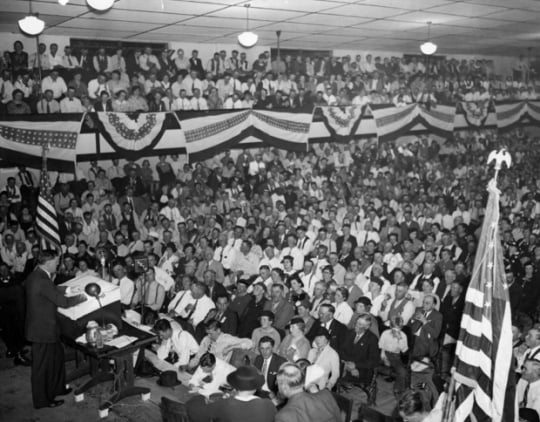
Elmer Benson at a Farmer-Labor Convention
Governor Elmer Benson speaking at a Farmer-Labor state convention in Duluth, 1938.
Holding Location
More Information
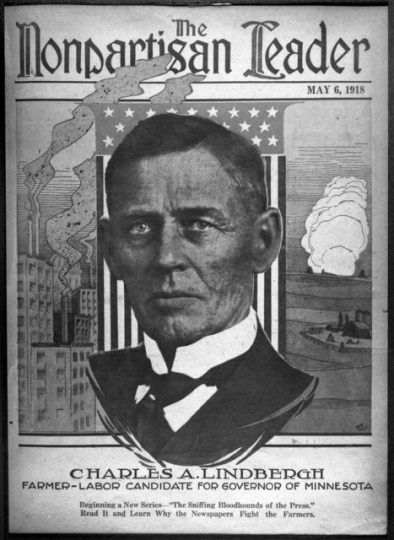
Cover of the Nonpartisan Leader featuring Charles A. Lindbergh
Charles A. Lindbergh featured on the cover of the Nonpartisan Leader, the Nonpartisan League's official publication, May 6, 1918.
Public domain
Holding Location
More Information

Farmer-Labor Convention, Minneapolis
Farmer-Labor Convention, Minneapolis, 1922.
Holding Location
More Information
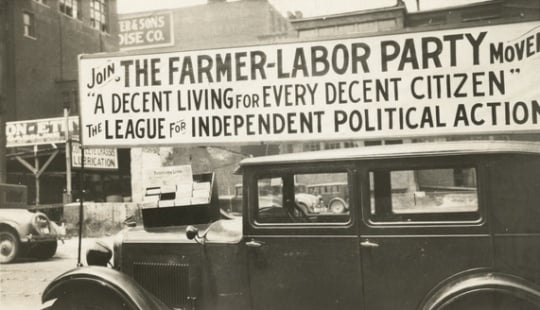
A Farmer-Labor political poster atop an automobile
A Farmer-Labor political poster atop an automobile, c.1925.
Holding Location
More Information
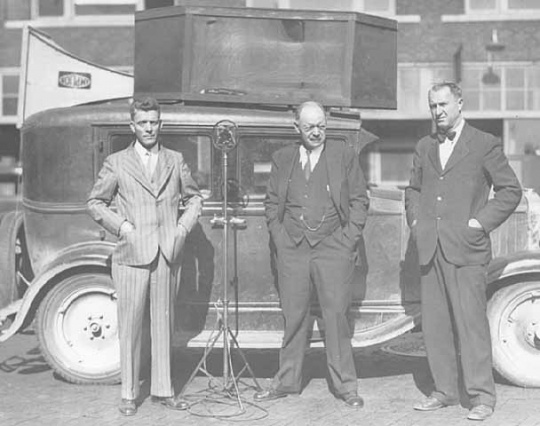
Henry G. Teigan, Magnus Johnson, and Arthur C. Townley
Henry G. Teigan, Magnus Johnson, and Arthur C. Townley, c.1930.
Holding Location
More Information
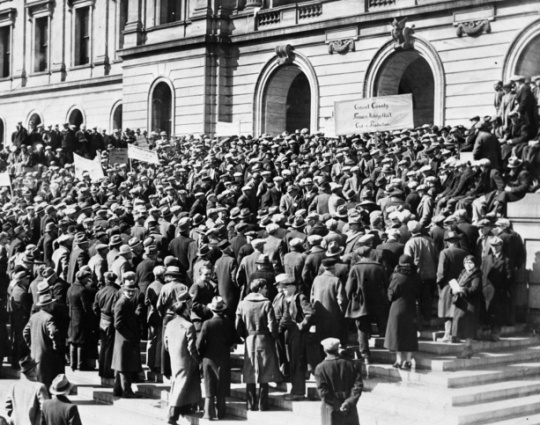
Farmers storm Capitol to demand relief
Farmers storming the Minnesota State Capitol to demand relief, 1933.
Holding Location
More Information
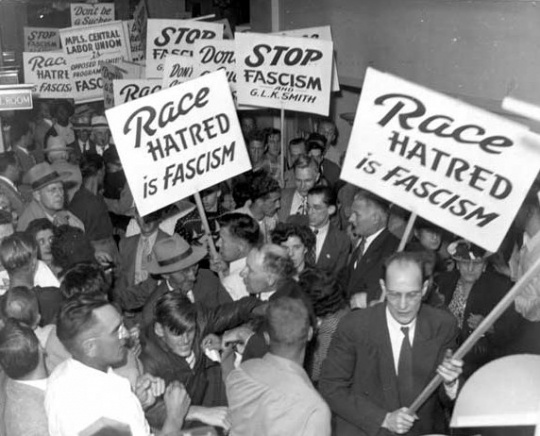
Members of the Socialist Workers Party demonstrating
Members of the Socialist Workers Party demonstrating, c.1935.
Holding Location
More Information
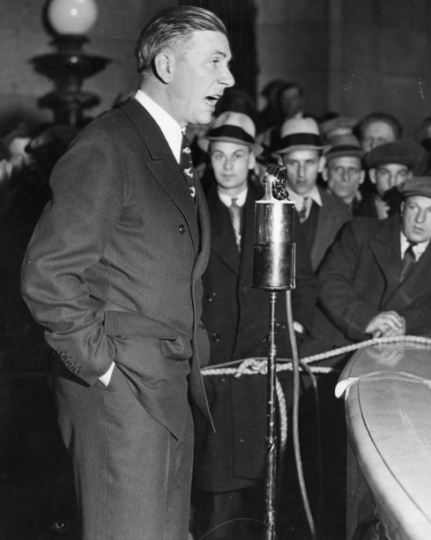
Governor Floyd B. Olson
Governor Floyd B. Olson, c.1935.
Holding Location
More Information
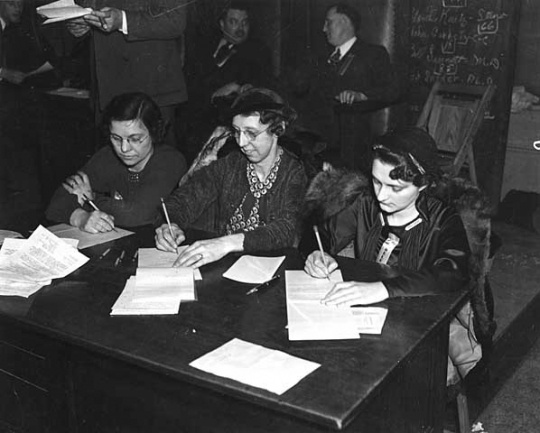
Farmer-Labor party of Hennepin County chooses delegates
Farmer-Labor party of Hennepin County chooses delegates, 1936.
Holding Location
More Information
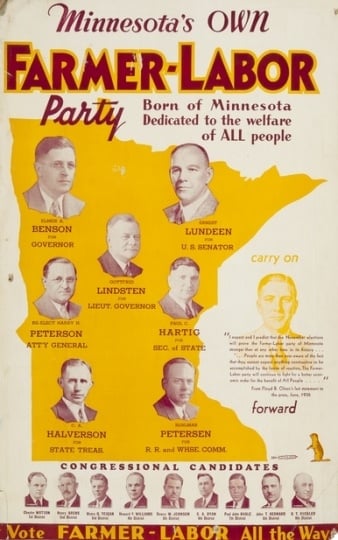
Minnesota's own Farmer-Labor party
Minnesota's own Farmer-Labor party, 1936.
Holding Location
More Information
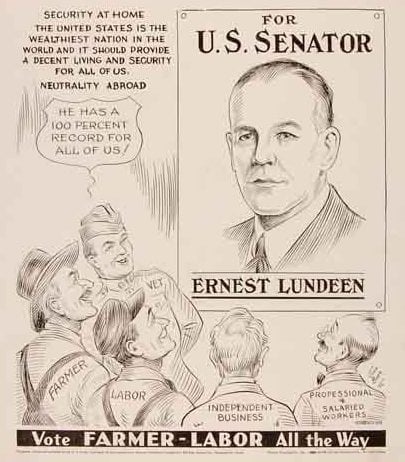
"Vote Farmer-Labor All the Way"
"Vote Farmer-Labor All the Way," 1937.
Holding Location
More Information
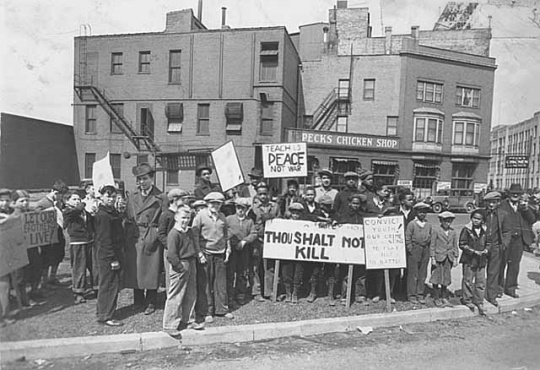
Peace demonstration, Minneapolis
Peace demonstration on Grant Street East between Second and Third Avenues South, Minneapolis; possibly sponsored by Phyllis Wheatley House, 1936.
Holding Location
More Information
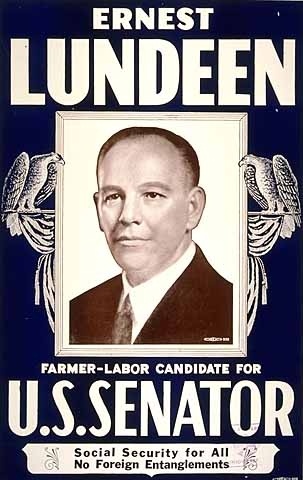
"Ernest Lundeen, Farmer-Labor Candidate for U.S. Senate"
"Ernest Lundeen, Farmer-Labor Candidate for U.S. Senate," 1936.
Holding Location
More Information
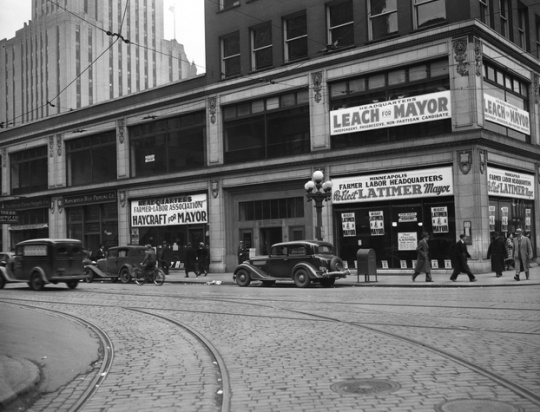
Minneapolis street corner showing the Farmer-Labor Party headquarters
Minneapolis street corner showing the Farmer-Labor Party headquarters, 1937.
Holding Location
More Information
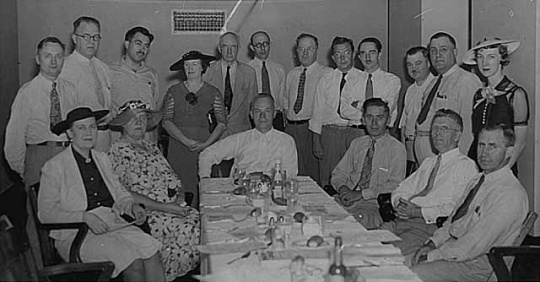
Meeting of progressives to discuss third-party options
Progressives meet to decide whether they should form a national third party based on Farmer-Labor and similar liberal groups, 1937.
Holding Location
More Information
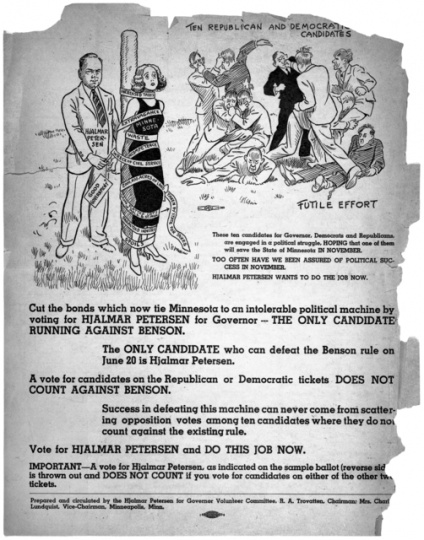
Campaign literature for Hjalmar Petersen
Campaign literature for Hjalmar Petersen, Farmer-Labor Party candidate for Governor, 1938.
Holding Location
More Information
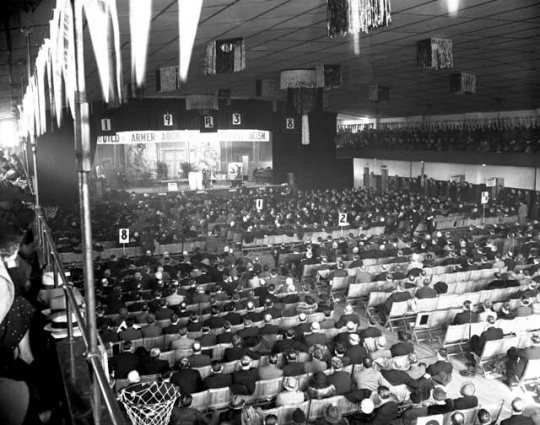
A Farmer-Labor party rally against fascism
A Farmer-Labor party rally against fascism, 1938.
Holding Location
More Information
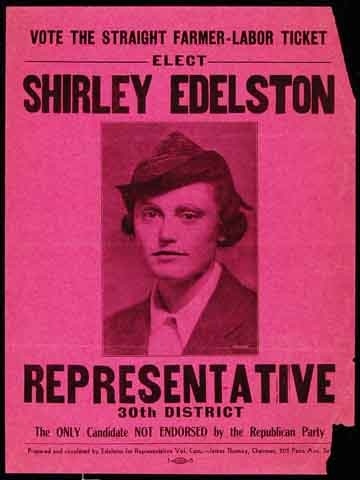
"Vote the Straight Farmer-Labor Ticket - Elect Shirley Edelston"
"Vote the Straight Farmer-Labor Ticket - Elect Shirley Edelston," c.1940.
Holding Location
More Information
Related Articles
Turning Point
In November 1930, the election of the charismatic Floyd B. Olson to the governorship ushers in an era of Farmer-Labor power in Minnesota politics.
Chronology
Summer 1918
Fall 1918
1922
1924
1930
1932
1933
1934
1934–1935
Fall 1936
1937
1938
1944
Winter–Spring 1948
Fall 1948
Bibliography
Chrislock, Carl. The Progressive Era in Minnesota, 1899–1918. St. Paul: Minnesota Historical Society Press, 1971.
Gieske, Millard L. Minnesota Farmer-Laborism: The Third-Party Alternative. Minneapolis: University of Minnesota Press, 1979.
Haynes, John Earl. Dubious Alliance: The Making of Minnesota’s DFL Party. Minneapolis: University of Minnesota Press, 1984.
Holbo, Paul S. “The Farmer-Labor Association, Minnesota’s Party Within a Party.” Minnesota History 38, no. 7 (September 1963): 301–309. http://collections.mnhs.org/MNHistoryMagazine/articles/38/v38i07p301-309.pdf
Mayer, George. H. The Political Career of Floyd B. Olson. St. Paul: Minnesota Historical Society Press, 1987.
McCurry, Dan C., comp. The Farmer-Labor Party: History, Platform and Programs. New York: Arno Press, 1975.
Naftalin, Arthur. “A History of the Farmer-Labor Party in Minnesota.” PhD diss., University of Minnesota, 1948.
Valelly, Richard, M. Radicalism in the States: the Minnesota Farmer-Labor Party and the American Political Economy. Chicago: University of Chicago Press, 1989.
Youngdale, James M. Populism: A Psychohistorical Perspective. Port Washington, NY: Kennikat Press, 1975.
Related Resources
Primary
Editor’s note: for an extensive listing and description of farmer-labor-related primary sources, see: Ross, Carl. Radicalism in Minnesota, 1900-1960: A Survey of Selected Resources. The 20th Century Radicalism in Minnesota Project. St. Paul: Minnesota Historical Society Press, 1994.
P1004
Arthur Le Sueur papers, c.1910–1954
Manuscript Collection, Minnesota Historical Society, St. Paul
Description: Correspondence, clippings, printed materials, legal papers, and other items relating to Le Sueur’s activities as a Minneapolis lawyer; as dean of the law department of the socialist People’s College, Fort Scott, Kansas (c.1914–1917); and as executive secretary of the National Nonpartisan League (c.1917–1919.)
P480
Elmer A. Benson papers, 1931–1963, 1973–1978
Manuscript Collection, Minnesota Historical Society, St. Paul
Description: Correspondence, clippings, speeches, political literature, and publications relating to Benson’s career as Farmer-Labor Party leader, Minnesota commissioner of banking (1933–1935), U.S. senator (1935–1936), and governor of Minnesota (1937–1939).
P337
Farmer-Labor Association of Minnesota records, 1918–1948
Manuscript Collection, Minnesota Historical Society, St. Paul
Description: Proceedings of conventions, minutes of meetings, speeches, and correspondence of this political association. There is information on patronage, tax reform, collective bargaining, strikes, the labor movement, political conventions and campaigns, and Minnesota political figures, including Victor E. Lawson, Ernest Lundeen, William Mahoney, Floyd B. Olson, and Harold Stassen.
Farmer-Labor Leader. All issues. St. Paul: Minnesota Farmer-Labor Association, 1930–1934.
A/.052
Floyd B. Olson papers, 1923–1974
Manuscript Collection, Minnesota Historical Society, St. Paul
Description: Correspondence, press releases, speeches, clippings, campaign literature, and miscellany, chiefly for the period (1930–1936) when Olson was governor of Minnesota. They provide information on the Farmer-Labor party, conservation of natural resources, agriculture, education, taxation, cooperatives, labor unions, municipal ownership, state government, the Farmer-Labor Association and its educational bureau including a copy of its charter of 1923, a controversy with Senator Anton J. Rockne regarding state relief for the unemployed, the 1932 gubernatorial election, and Olson’s death.
P874; M202; M441
Howard Y. Williams and family papers, c.1908–1973
Manuscript Collection, Minnesota Historical Society, St. Paul
Description: The papers of Williams, a Congregational minister and political activist in St. Paul, Minnesota (1918-1954) and in Butte, Montana (1955-1964), primarily document his career in third-party and other political organizations from 1929 to 1970. As well as his personal and official correspondence, there are press releases, clippings, minutes of meetings, financial statements, membership records, political conference materials, speeches and articles, and scrapbooks. Also includes family correspondence; diaries; and lecture and sermon notes.
A/+S925; A/.S925
Irwin Charles Strout papers, 1922–1939
Manuscript Collection, Minnesota Historical Society, St. Paul
Description: Correspondence, campaign literature, scrapbooks, and other materials concerning Strout’s role as a political activist with the Farmer-Labor Association from the early 1920s, as state hotel inspector (1931-1933), Minnesota budget commissioner and director of personnel (1933-1935), senior examiner in the office of the comptroller (1935-1936), and accountant in the Minnesota Highway Department (1938). The papers have considerable data on politics, particularly political patronage, in 1930-1935.
Minnesota Leader. All issues. St. Paul: Minnesota Farmer-Labor Association, 1935–1949.
OH 22 and OH72
Oral History Collection, Minnesota Historical Society, St. Paul
Description: Oral history interviews with Elmer Benson.
http://collections.mnhs.org/cms/display.php?irn=10446002
http://collections.mnhs.org/cms/display.php?irn=10386658
OH 30
Oral History Collection, Minnesota Historical Society, St. Paul
Description: Oral history interview with Arthur Borchardt recorded in 1976. Forms part of the Twentieth-Century Radicalism in Minnesota Oral History Project.
http://collections.mnhs.org/cms/display.php?irn=10362510
OH 30
Oral History Collection, Minnesota Historical Society, St. Paul
Description: Oral history interview with Irwin Herness recorded in 1977. Forms part of the Twentieth-Century Radicalism in Minnesota Oral History Project.
http://collections.mnhs.org/cms/display.php?irn=10362550
OH 30
Oral History Collection, Minnesota Historical Society, St. Paul
Description: Oral history interview with Jenny Mayville recorded in 1977. Forms part of the Twentieth-Century Radicalism in Minnesota Oral History Project.
http://collections.mnhs.org/cms/display.php?irn=10362564
OH 30
Oral History Collection, Minnesota Historical Society, St. Paul
Description: Oral history interview with Orville Olson recorded in 1977. Forms part of the Twentieth-Century Radicalism in Minnesota Oral History Project.
http://collections.mnhs.org/cms/display.php?irn=10444483
OH 30
Oral History Collection, Minnesota Historical Society, St. Paul
Description: Oral history interview with Ruth Siegler recorded in 1977. Forms part of the Twentieth-Century Radicalism in Minnesota Oral History Project.
http://collections.mnhs.org/cms/display.php?irn=10444484
D-33
[Newsreels], Paramount News, 1934–1949
Audiovisual Collection, Minnesota Historical Society, St. Paul
Description: The newsreels include coverage of farm protests, Governor Floyd Olson’s call for a third party, a Farmer-Labor convention, the Minneapolis truckers’ strike, and more.
Audiotape #48
People, Pride and Politics: Building the North Star Country [sound recording]
Audiovisual Collection, Minnesota Historical Society, St. Paul
Description: The film features firsthand accounts of early farm and unemployment organizing in the 1930s.
Records of Floyd B. Olson, Hjalmar Petersen, and Elmer A. Benson, 1932–1938
Minnesota, Governor
State Archives, Minnesota Historical Society, St. Paul
Description: General correspondence, subject matter files, state department files, federal department files, and organization files documenting the gubernatorial service of Olson (1931–1936), Petersen (1936–1937), and Benson (1937–1939).
http://www2.mnhs.org/library/findaids/gr00063.xml
Records of Governor Floyd B. Olson, 1931–1932
Minnesota, Governor
State Archives Collection, Minnesota Historical Society, St. Paul
Description: General correspondence, subject files on public policy matters, files on state departments and agencies, federal department files, and organizations files.
http://www2.mnhs.org/library/findaids/gov036.xml
Susie Williamson Stageberg papers, c.1877–1961
Manuscript Collection, Minnesota Historical Society, St. Paul
Description: Correspondence, clippings, articles, organizational records, campaign literature, and songbooks of Stageberg, executive secretary of the Women's Nonpartisan Clubs of Minnesota (c.1922–1925) and a candidate for various state offices on the Farmer-Labor and Progressive party tickets.
http://www2.mnhs.org/library/findaids/P0001.xml
P1280
Viena Rakel Pasanen Johnson Hendrickson and family papers, 1892–1980
Manuscript Collection, Minnesota Historical Society, St. Paul
Description: The collection inclues family and biographical data, including newspaper clippings, a transcript of an interview with Viena Hendrickson, an application for federal employment, composition books (some in Finnish), scrapbooks detailing the activities of Hendrickson and her parents, Henry A. and Ida Pasanen, and those of her husband, Paul Hiram Hendrickson.
Vince A. Day papers, 1906–1945
Manuscript Collection, Minnesota Historical Society, St. Paul
Description: Correspondence, speeches, clippings, printed materials, scrapbooks, and other papers of Day, private secretary to Minnesota governor Floyd B. Olson (1931–1935) and a Minneapolis municipal and Hennepin County district court judge (1935–1945).
http://www2.mnhs.org/library/findaids/01126.xml
Secondary
Beecher, John. Tomorrow is a Day: The Story of the People in Politics. Chicago: Vanguard Books, 1980.
Chrislock, Carl H. Watchdog of Loyalty: The Minnesota Commission of Public Safety During World War I. St. Paul: Minnesota Historical Society Press, 1991.
De Graff, John, and Mulligan, Jim. A Common Man’s Courage. Minneapolis: University Community Video, 1978.
——— . Labor’s Turning Point: The Minneapolis Truck Strikes of 1934: A Rank and File Story. St. Paul: Twin Cities Public Television, 1981.
Delton, Jennifer A. Making Minnesota Liberal: Civil Rights and the Transformation of the Democratic Party. Minneapolis: University of Minnesota Press, 2002.
Garlid, George W. “The Anti-War Dilemma of the Farmer-Labor Party.” Minnesota History 40, no. 8 (Summer 1967): 365–374.
http://collections.mnhs.org/MNHistoryMagazine/articles/40/v40i08p365-374.pdf
Gilman, Rhoda R. Stand Up! The Story of Minnesota’s Protest Tradition. St. Paul: Minnesota Historical Society, 2012.
Hudelson, Richard, and Carl Ross. By the Ore Docks: A Working People’s History of Duluth. Minneapolis: University of Minnesota, 2006.
Jenson, Carol E. “Loyalty as a Political Weapon: the 1918 Campaign in Minnesota.” Minnesota History 43, no. 2 (Summer 1972): 42–57.
http://collections.mnhs.org/MNHistoryMagazine/articles/43/v43i02p042-057.pdf
Keillor, Steven J. Cooperative Commonwealth: Co-ops in Rural Minnesota, 1859–1939. St. Paul: Minnesota Historical Society Press, 2000.
——— . Hjalmar Petersen of Minnesota: the Politics of Provincial Independence. St. Paul: Minnesota Historical Society Press, 1987.
Lansing, Michael J. Insurgent Democracy: The Nonpartisan League in North American Politics. Chicago: University of Chicago Press, 2015.
Larson, Bruce. Lindberg of Minnesota: a Political Biography. New York: Harcourt Brace Jovanovich, 1971.
Le Sueur, Meridel. Crusaders: The Radical Legacy of Marian and Arthur Le Sueur. St. Paul: Minnesota Historical Society Press, 1984.
Morlan, Robert L. Political Prairie Fire: The Non-Partisan League, 1915–1922. Minneapolis: University of Minnesota Press, 1955.
Nielsen, Kim. “Who Were These Farmer-Labor Radicals?: The Douglas County Farm Holiday Association.” Minnesota History 51, no. 7 (Fall 1989): 270–280.
http://collections.mnhs.org/MNHistoryMagazine/articles/51/v51i07p270-280.pdf
Shields, James M. Mr. Progressive: A Biography of Elmer A. Benson. Minneapolis: T. S. Dennison, 1971.
Stuhler, Barbara. “The One Man Who Voted ‘Nay’: The Story of John. T. Bernard’s Quarrel with American Foreign Policy, 1937–1938." Minnesota History 43, no. 3 (Fall 1972): 82–92.
http://collections.mnhs.org/MNHistoryMagazine/articles/43/v43i03p082-092.pdf
Walker, Charles Rumford. American City: A Rank and File History. Minneapolis: University of Minnesota Press, 2005.
Youngdale, James M. Third Party Footprints: An Anthology from Writings and Speeches of Midwest Radicals. Minneapolis: Ross & Haynes, 1966.



















